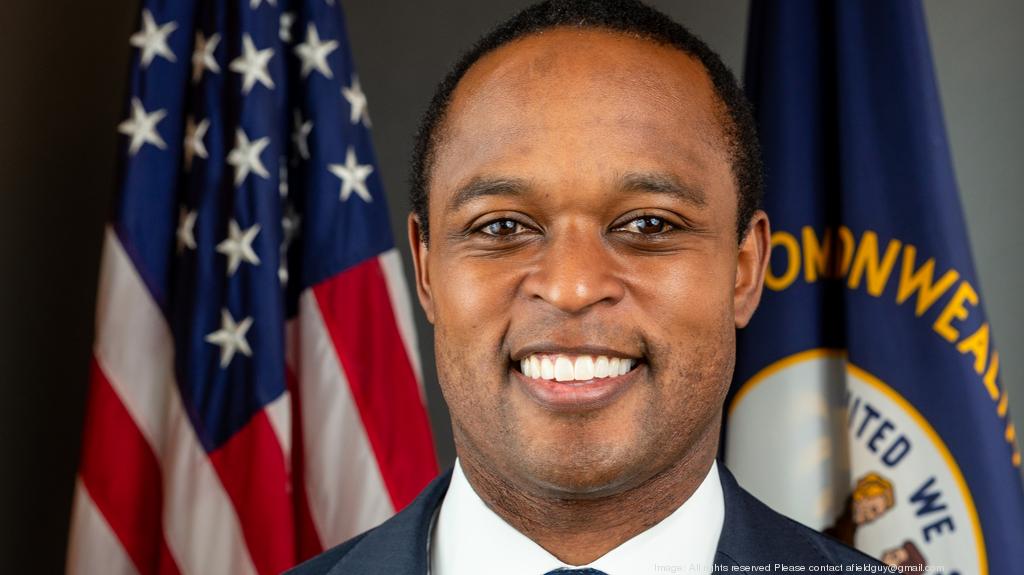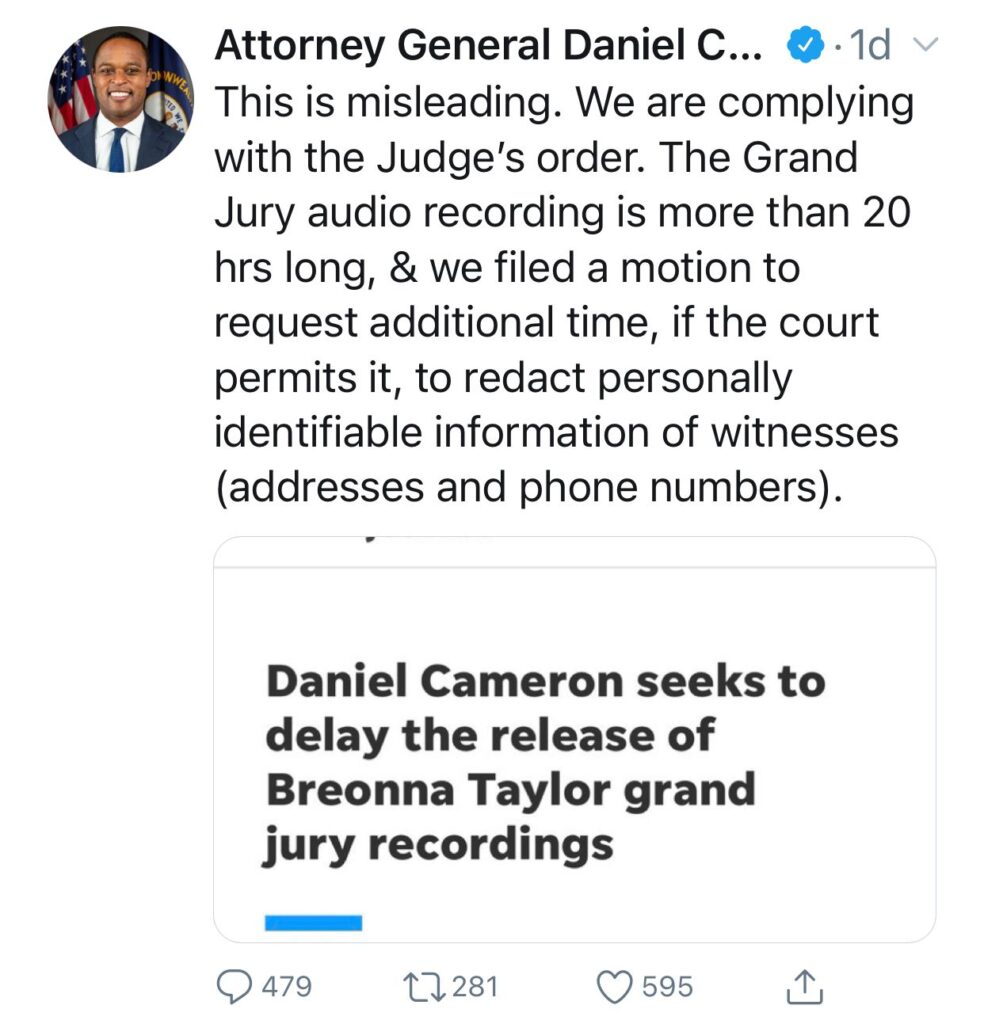
Photographer: Heath Stiltner
Louisville, KY – A grand juror in the Breonna Taylor case has suggested that Kentucky Attorney General, Daniel Cameron, may have misrepresented the proceedings in the Breonna Tayler Grand Jury Case to the public, a lawyer for the juror said.
According to reports obtained by CNN, the grand juror, who remains anonymous, has filed a motion in court to have all recordings, transcripts and reports of the grand jury relating to the case be released to the public. The juror has also petitioned the court in “making a binding declaration” that the grand juror has the right to disclose information and details about the process of the proceedings. Special focus is being given to the motion states, in efforts to avoid fears that Cameron would attempt to use the court’s powers of contempt in the case of public disclosure.
Cameron initially expressed shock over the request and refused to release the documentation. Cameron stated he would not disclose the grand jury presentation because it would interfere with other investigations, reports CNN. He reiterated his stance on the request by saying “We stand by our belief that such a release could compromise the ongoing federal investigation and could have unintended consequences such as poisoning the jury pool.”
This prompted Jefferson County Circuit Judge Ann Bailey Smith to order Cameron’s office to release the recording and other records related to the grand jury hearing after the grand juror filed the motion asking asking for the materials to be released, granting them the freedom to speak about the decision made in the case, according to ABC News.
In the motion obtained by CNN, the grand juror states “The citizens of the Commonwealth have demonstrated their lack of faith in the process and proceedings in this matter and the justice system itself. Using grand jurors as a shield to deflect accountability for these decisions only sows more seeds of doubt in the process while leaving a cold chill down the spine of future grand jurors.”
As reported by CNN, Kevin Glogower, the attorney of the juror, told reporters, “My client wants to make sure the truth gets out.” Glogower said the juror contacted his office Friday, 25 Sept., noting the juror’s request for representation was highly unusual for Glogower’s 15 years of practice. Glogower alleges that Cameron’s initial public statements had “laid a lot of responsibility at the grand jurors’ feet” but his most recent declarations “attempted to walk that back.” This left unanswered questions about what evidence was presented to the grand jury and what charging recommendations were made.
Ben Crump, an attorney for the Taylor family, spoke on the ruling at Jefferson Square Park, the epicenter of protest, during the Taylor family’s first press conference before reporters and protestors. Journalists from the Louisville Courier-Journal reports that Crump raised questions over what evidence Cameron presented to the jury when addressing the lack of charges the Taylor case. Crump calls this decision part of a “pattern of the blatant disrespect and marginalization of Black people, but especially Black women.”
“There seems to be two justice systems in America: One for Black America, and one for white America,” Crump said, before leading the crowd in chants of “Release the transcripts!” Crump said.
Neither of the officers who fired shots during the raid or the shots that killed Taylor
In a stunning turn of events, it was announced on Sunday, Sept. 27, that the ballistics report from the Kentucky State Police on the Taylor shooting could not determine that Walker shot one of the officers who unleashed the barrage of bullets into her apartment. According to records obtained by ABC News, the case against Walker and justification for the officers actions were based primarily on the fact that Walker fired the first shot in the fatal confrontation that lead to Taylor’s death. This new information serves as a contradiction to statements made by Cameron that lead the grand jury to decide not to indict LMPD Officer Mattingly, Officer Cosgrove
In an interview with ABC News, Steve Romines, one of the attorneys for Walker, said, “the Kentucky State Police’s own ballistics report could not determine that Kenneth’s shot hit Officer Mattingly.” Walker claimed he fired a warning shot because he initially thought the plainclothes officers were intruders. Walker’s civil suit also raises the possibility that Mattingly was wounded by friendly fire from one of the other officers. A portion of the Kentucky State Police ballistic report obtained by ABC News indicates that the
Walker’s attorneys also filed a court motion to have the grand jury transcript and the full report on the investigation by the Metro Police’s Public Integrity Unit be made public to “promote ‘the ends of justice’ and the search for the truth.” The motion argues the material is important in Walker’s freedom from further arrest and prosecution in the shooting.
Cameron refused to tell reporters whether he recommended that grand jurors exonerate all three police officers on homicide charges, citing the secrecy of grand jury proceedings. On Monday, Sept. 28, Cameron announced that he will comply with the judge’s ruling and release the requested information, but was granted a 48-hour delay in releasing the grand jury recordings in the Taylor case. Requesting more time just hours before he was ordered by Judge Smith to place the materials in the court record, according to ABC News. Cameron requested a week to redact names and personal information of witnesses and private citizens from the 20 hours of audio recordings that Smith ordered him to place in court records by noon on Wednesday, Sept. 30. Cameron took to Twitter denying claims that he was intentionally delaying the release of the grand jury recordings.

“This is misleading. We are complying with the Judge’s order. The Grand Jury audio recording is more than 20 hrs long, & we filed a motion to request additional time, if the court permits it, to redact personally identifiable information of witnesses (addresses and phone numbers),” Cameron tweeted.
Smith revised the orders requiring that Cameron immediately file an unredacted copy of the recording to be kept under court seal of the grand jury hearing that produced the single charge of wanton endangerment against one of the officers involved in the shooting. Despite Cameron’s objections, he would comply with the judge’s order, ABC News reports.
According to NBC News, the only charges in the case are against former Louisville Metro Police Department officer Brett Hankison, who was fired in June for violating police department policy in the shooting. The charges stem from firing errant shots into Taylor’s apartment that penetrated a wall and entered the residence of a white family that lived next
